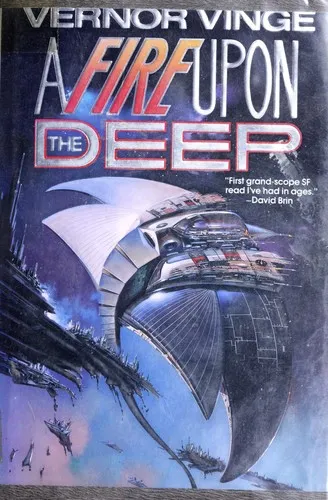4
mentions
mentions

Only chapter 1, describing a flowering Superintelligence, really awesome read. Later chapters went downhill.
— Andrej Karpathy
2016-11 on quorasessionwithandrejkarpathy.quora.com
I finished Vernor Vinge's "A Fire Upon the Deep". Reviewed on Goodreads
— Andrej Karpathy
2014-10-12 on twitter.com
https://twitter.com/karpathy/status/521392801779437568
A Fire Upon The Deep is a Hugo-award-winning scifi by a Mathematician, Vernor Vinge. It is a mixed bag of awesome ideas alongside high-school grade ideas about a universe full of alien races that ultimately falls flat of the promise it sets up in the first few chapters. I have a tendency to prefer books written by scientists turned authors because I find the presented ideas to be always more interesting, plausible, consistent and generally less magic-like. Combined with the fact that the book came warmly recommended by my friends, I had no hesitations in plunging right into it. The first few chapters of the book hooked me right away: a stunning narrative from the point of view of a god-like, ancient super-intelligence, a compelling and fantastic sketch of a life-filled universe, intriguing concepts of zones, an entire hierarchy of computational supremacy among living things from Slowness to the Transcend (and even hints of beyond), and a pack-mind Tine race who communicate among members with ultrasound waves. These chapters were a joy to read and I basked in the awesomeness of many of these ideas as they came up. However, the story, character development, and new revelations about the universe quickly begin to lose pace. Instead of the Transcend and Power super-intelligences we get to learn much more about a medieval-age Tine race, which is disappointingly the focus of the story, together with all the petty intrigues among them and their clans. This is not what I signed up for. The final climax of the book was similarly disappointing: The book spends the majority of the time building up to a final epic confrontation that decides the fate of an entire galaxy, but it never actually happens and instead gets resolved in an unsatisfying manner. Mixed in among many other cool ideas there were also many annoyances that I would expect from JK Rowling, but not from Verner Vinge. Examples: - The Tine race just happens to have almost exactly the same physiology as dogs? They are made of muscles? They breath oxygen? They see in the same random spectrum of light that humans do? They communicate by waves of air pressure as humans do? They feel pain, have emotions, ambitions, empathy? This is just like little green men, but, oh, pack minds. - The millions of super-advanced civilizations int he Beyond communicate by sending each other messages that look like 1990 Newsgroups? It’s puzzling that a book can be a mix of really interesting ideas alongside other silly ideas that could have been conceived of by a high-school child (e.g. Tines as cute packs of dogs, with old, wise queen, a traitor, a bad, evil one, etc.). Conclusion: Read the first few chapters. When it starts to get boring Stop, read the rest of the plot on Wikipedia, move on and spare yourself the disappointment. 3/5
— Andrej Karpathy
2014-10-12 on goodreads.com
Incredible first chapter, bit downhill from there. Disliked everything about the Tine race of sentient ... dogs?
— Andrej Karpathy